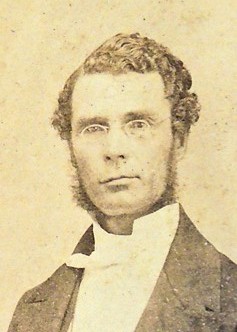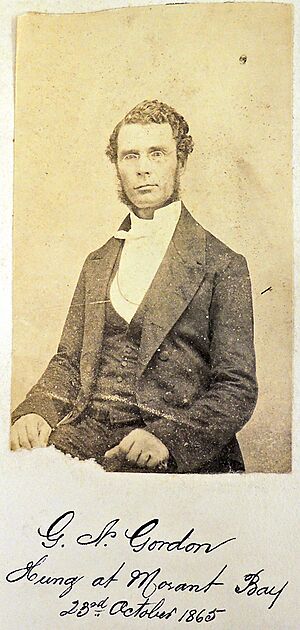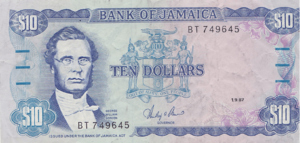George William Gordon facts for kids
Quick facts for kids
The Right Excellent
George William Gordon
|
|
|---|---|

George William Gordon
|
|
| Born | 1820 |
| Died | Executed, 23 October 1865 Morant Bay, Jamaica
|
| Nationality | Jamaican |
George William Gordon (born 1820 – died October 23, 1865) was an important Jamaican leader. He was a successful businessman and politician. He was also a mixed-race man, meaning he had both African and European ancestors. Gordon was one of the representatives for the St. Thomas-in-the-East area in Jamaica's government, called the Assembly.
Gordon was a strong critic of the government at the time. He often spoke out against the rules made by the British Governor, Edward John Eyre. After a major event called the Morant Bay rebellion in 1865, Governor Eyre ordered Gordon's arrest. Gordon was quickly put on trial and executed. Many people in Britain thought this was unfair. Because of the controversy, Governor Eyre had to leave his job. The British government then took direct control of Jamaica, making it a Crown colony. Years later, in 1969, the Jamaican government honored George William Gordon by naming him a National Hero of Jamaica.
Contents
Early Life and Freedom
George William Gordon was born in Jamaica around 1820. His father, Joseph Gordon, was a Scottish planter. His mother, Ann Rattray, was an enslaved woman. George was the second of eight children. His father owned several properties, including Cherry Garden Estate, where George was born.
George was born into slavery, but his father gave him his freedom. When he was about ten years old, he went to live with his godfather, James Daly. George taught himself to read, write, and do math. Within a year, he started working in Daly's business.
A Successful Businessman
In 1836, young George Gordon opened his own store in Kingston. He bought and sold farm products. A well-known lawyer, Richard Hill, met him that year. Hill said that even though Gordon was young, he seemed very good at business.
Gordon became a very successful businessman. By 1842, he had earned enough money to send his sisters to schools in England and France. Just three years later, he was worth a lot of money. Even though his father had not been very involved in his childhood, George helped his father when he faced money problems. George paid off his father's debts and gave him back his family estate.
Later, Gordon moved to St. Thomas-in-the-East Parish. There, he became a wealthy landowner. In the 1840s, he helped start the Jamaica Mutual Life Assurance Society. He was also made a justice of the peace in seven different areas. This meant he could help keep order and deal with minor legal issues.
Political Career and Advocacy
In the 1850s, George Gordon became involved in politics. He was elected to the House of Assembly for St. Thomas-in-the-East. He even filled in as mayor of Kingston sometimes.
Gordon was a strong voice for the poor black people in Jamaica. He saw their struggles and wanted to help. He complained to the governor about the bad conditions in the Morant Bay prison. In 1862, when he complained to Governor Eyre, the governor removed Gordon from his position as a magistrate. However, the British government in London actually praised Gordon for trying to improve prison conditions.
By the mid-1860s, Gordon was well known for criticizing the colonial government and Governor Eyre. He also started a church where Paul Bogle was a leader.
In 1863, Gordon won another election for the Assembly. He had strong support from small farmers, thanks to Paul Bogle. Gordon also became a member of the local parish council, called the vestry. However, the powerful people who ran the vestry did not like Gordon. They tried to remove him because he spoke up for the black farmers. But the farmers re-elected Gordon the next year.
The Morant Bay Rebellion
There were many reasons for the Morant Bay rebellion in 1865. One big reason was the anger among black farmers in St. Thomas-in-the-East. They were upset that George Gordon and Paul Bogle had been unfairly removed from the local council.
In October 1865, Paul Bogle led a protest that turned into a riot. Governor Eyre used soldiers, including Jamaican Maroons, to stop the rebellion. Hundreds of black Jamaican men and women were killed by the soldiers. Many were killed without a proper trial.
His Death and What Happened Next
After the Morant Bay Rebellion, Governor Eyre believed that George Gordon had planned it. He ordered Gordon's arrest in Kingston. Kingston was not under martial law (military rule), but Morant Bay was. Governor Eyre had Gordon taken to Morant Bay.
Within two days, Gordon was put on trial by a military court. He was accused of a serious crime against the government. He did not get a fair trial. He was sentenced to death and executed on October 23, 1865. Paul Bogle was executed the next day.
Gordon's execution and the harsh way Governor Eyre stopped the rebellion caused a huge scandal in Britain. Many people, including a famous thinker named John Stuart Mill, tried to have Governor Eyre put on trial for murder. They were not successful in getting a trial, but Governor Eyre was forced to resign from his job.
Legacy and Honors
In the 1900s, George William Gordon became a symbol of Jamaican nationalism. People saw him as someone who fought for Jamaica's independence. A play about his life, called George William Gordon, was written in 1938 by Roger Mais.
In 1960, the Jamaican Parliament moved into a new building. It was named Gordon House, in honor of George William Gordon.
In 1969, the Jamaican government officially named Gordon and Paul Bogle as Jamaican National Heroes. This is the highest honor in Jamaica.
Also in 1969, Jamaica changed its money system. George Gordon's picture was put on the ten-dollar note, which is now a coin.
George William Gordon is also mentioned in many reggae songs. These include "Innocent Blood" by Culture, "Silver Tongue Show" by Groundation, and "Born Fe Rebel" by Steel Pulse.
|



